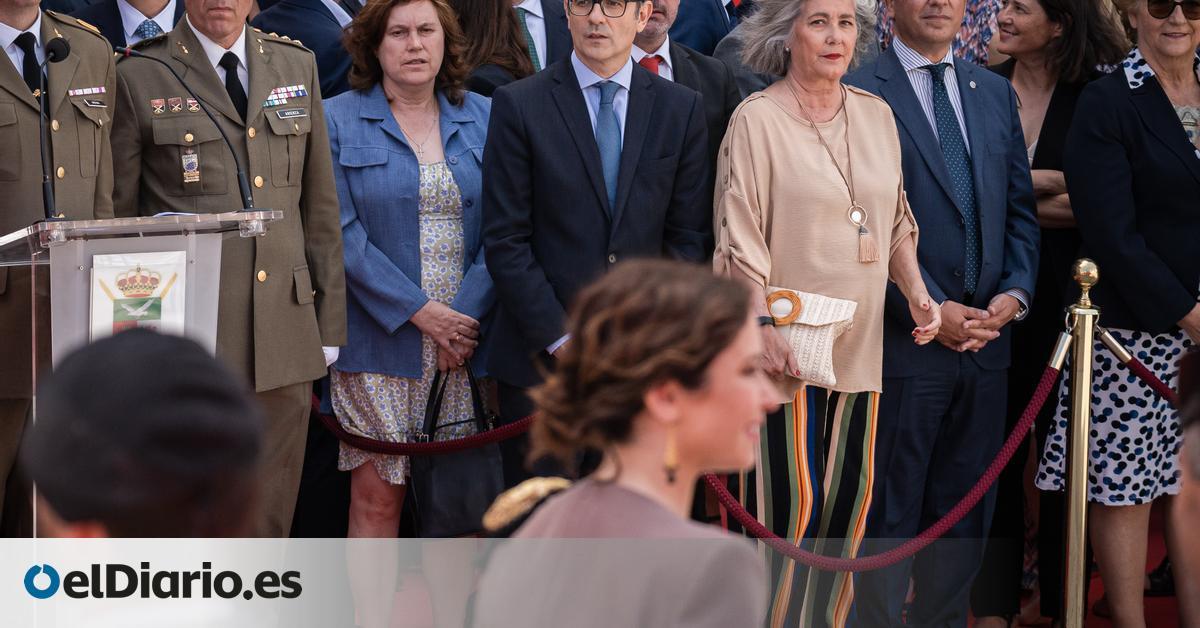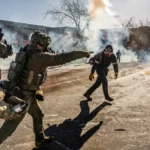
Alberto Núñez Feijóo warned it months in advance: the Popular Party wants the motion of censure that it has not presented against Sánchez in Congress during these three long years of legislature to be on May 28 in the municipal and regional elections. And in their strategy of total war against the government, the popular ones are already taking advantage of all fronts, including the institutions where they govern. All in all, the May 2 party in Madrid on Tuesday offered an unprecedented image even for convulsed Spanish politics: the person in charge of protocol for an autonomous community vetoing a government minister from passing an official act. The sequence of the high office of Isabel Díaz Ayuso cutting off Félix Bolaños’s access to the authorities’ rostrum is the televised version of a thesis that the popular and their related media have deployed since the very beginning of Sánchez’s term, that of the Government ” illegitimate”.
Ayuso prevents Bolaños from going up to the stands of the Dos de Mayo parade but he does allow Feijóo
Further
The strategy that the Government of Ayuso deploys publicly is replicated by the leader of the PP, Alberto Núñez Feijóo, in clandestine meetings with conservative associations of prosecutors and police who have an obligation to maintain political neutrality and in which the PP candidate promises to repeal laws and in which the members of the Executive are attacked. The last known episode is the dinner held by the members of the Association of Prosecutors, the majority in the public ministry, and where senior representatives of the race uttered serious disqualifications against the Executive and its parliamentary allies. Similar meetings had already taken place before, some at the PP’s own headquarters, of police groups that agreed in Genoa 13 on their schedule of mobilizations against the Government.
Just four weeks before the elections, the electoral campaign for the regional and municipal elections in Madrid always has a particularly important date on the calendar: Dos de Mayo, Community Day. It is about the day that each year commemorates the anniversary of the revolt in Madrid against Napoleon, and that this year serves as a simile to explain a new uprising: that of the Popular Party against the Government on the eve of the 28M elections. Although Ayuso has always used this day for his personal troubles and as a propaganda instrument, the confrontational strategy against the Government climbed one more step this Tuesday with the veto of the Executive of Díaz Ayuso to Bolaños taking his place in the rostrum of authorities during the traditional military civic parade.
“What happens here will resonate throughout Spain,” Ayuso said during his institutional speech this Tuesday, as if anticipating what would happen just minutes later. The phrase reflects the extent to which the PP leader has based all her political capital on national projection with the confrontation with the central government. This constant clash against the Executive led her to obtain the result in the 4M elections in 2021, which left her only four seats short of an absolute majority, according to her team. Now, at the gates of 28M, the popular leader tries to repeat that same strategy, redoubling the bet. And with it he has forced Feijóo to copy it, pushed by a media right that asks him for more forcefulness against the Government.
In this context of constant clash against the Executive of Pedro Sánchez, the PP of Madrid had been in charge since the early hours of this Tuesday morning of feeding the idea that Bolaños attended the institutional acts of Dos de Mayo as a “squatter”. because he had not been invited by the regional government. “He has tried to come from a squat, he has forced the seams and the situation and he will have room, but it is not good to sneak in where you are not invited,” said the mayor of Madrid and PP candidate for City Council, José Luis Martínez-Almeida, upon arrival to the Puerta del Sol.
At that time, it seemed that the controversy that the regional president’s team had promoted throughout the weekend would end with few fuss. The Government of Madrid had reserved a place in the front row of the medal-giving ceremony for Bolaños together with the Defense Minister, Margarita Robles, in what seemed like a gesture of peace after hours of refusing his attendance, despite the fact that the The minister already attended these same acts on behalf of the Government a year ago.
But the confrontation, which is unprecedented in the history of this type of act, came shortly after when the regional president’s team warned that Bolaños had not reserved a seat in the authorities’ gallery for the civic-military parade. Ayuso had saved a place for the Minister of Defense and for Feijóo, the latter “as leader of the opposition,” they argued from the president’s team.
The Government criticizes the institutional “disloyalty”
From the Government they accuse the Community of Madrid of “failing in the basic duty of institutional loyalty” and of failing to comply with Royal Decree 2099/1983 by not allowing a minister of the Government of Spain to go up to the rostrum of the military parade that commemorates the feast of the Second of May Said norm establishes that the ministers –in the plural– have preference over the figure of the “head of the opposition” and that they will be arranged according to the position.
In 2018, with Ángel Garrido in the presidency of the Community of Madrid, two ministers were on the stand of the Dos de Mayo parade: María Dolores de Cospedal as Defense Minister and Soraya Sáenz de Santamaría as Vice President and Minister for Territorial Administrations and Presidency. In that act, on the other hand, the leader of the opposition -then Pedro Sánchez- was not present in the rostrum, although he was in the first row of the institutional speech of the president of the Community of Madrid.
The confrontation between the central and regional governments hides a second friction, visible this Tuesday when in the middle of the confrontation, a minister, Margarita Robles, offered to climb the lectern of personalities. During the previous celebration of Dos de Mayo, a year ago, the clash between the Presidency and Defense was at its peak due to the spying on the phones of the chief executive and at least two of his ministers, a matter that is still being investigated by the National Court.
Robles, who avoided resigning and ended up compromising with the dismissal of the CNI director, had tried to download responsibility for the security of communications from members of the Government of Spain in the department of Félix Bolaños. The clash was frontal and had a public facet, with mutual reproaches between Bolaños and Robles, the latter known for the determination she has shown for decades with friends and against enemies, even before dedicating herself to politics.
Feijóo meets with conservative fiscals
Added to the institutional clash over the Dos de Mayo acts was a new controversy starring Feijóo and which once again puts on the table the institutional confrontation that the PP is promoting from all fronts. “It was a correct and institutional meeting that I went to after an official invitation,” Feijóo said about his clandestine meeting with prosecutors, before participating in the events for the celebration of Dos de Mayo. For the Government, the meeting constitutes a “very serious” event that explains, among other issues, the PP’s refusal to renew the General Council of the Judiciary.
“Hoy [por este martes] we’ve heard he’s meeting on the sly with conservative prosecutors to make pledges to repeal laws. What do you want to repeal? The labor reform, the housing law, the Toledo pact? asked the president of the Executive, Pedro Sánchez, at the last minute, during a pre-election meeting in Malaga, reports Jose Enrique Monrosi. “This is the opposition we have suffered for four years. An opposition that maneuvers in the dark with hidden interests and whose sole objective is to repeal, go back, ”he settled.
Feijóo’s meeting with the majority association of prosecutors, conservative, takes place just four months after another controversial meeting between the PP president and public officials who have the rank of authority. Then they were police and civil guards, who must also maintain political neutrality in the exercise of their functions. On that occasion, the meeting at the national headquarters of the PP with the Police unions and the Civil Guard associations took place at the party’s proposal, as explained by the formation, with the argument that a new president always does it to present himself. . The meeting and its content were only known when they were revealed by elDiario.es the following day, December 21.
During the same, Feijóo was careful to be explicit in the call for the street mobilization of police and civil guards, but some of the representatives of the agents understood his intervention as an invitation to do so. The publication of the meeting influenced the rest of the unions and associations not to follow Jupol and Jucil (both heiresses of Jusapol) and the first of the two demonstrations planned before the elections was a failure. The second did not take place because there was no parliamentary agreement to reform the Gag Law.
As has happened with the meeting with the conservative prosecutors, Feijóo transferred to the police and civil guards that he would repeal government laws such as the ‘only yes is yes’ or the trans law when he arrived at La Moncloa.
Source: www.eldiario.es

